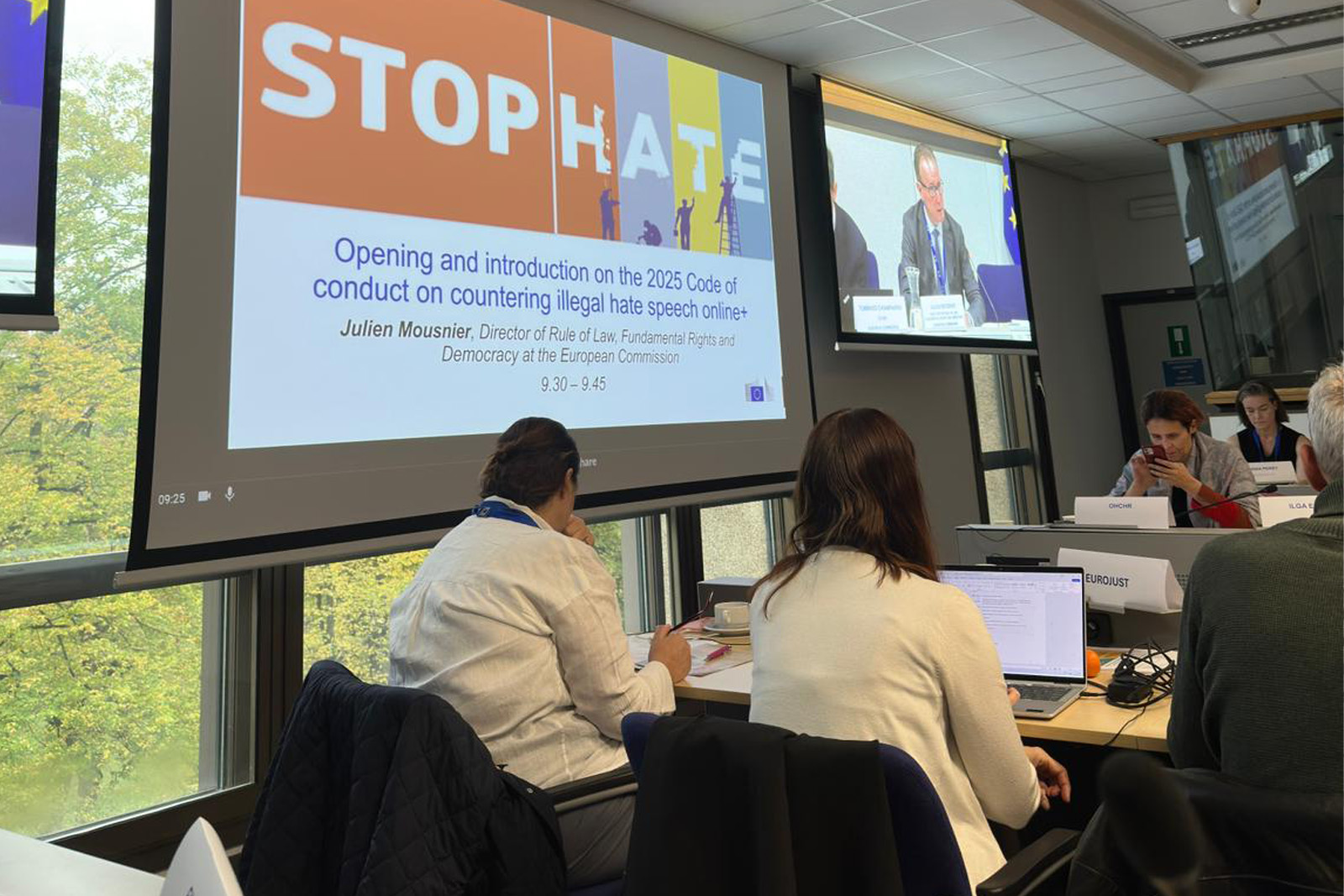On 16–17 October 2025, the European Commission convened the 13th meeting of the EU High-Level Group on Combating Hate Speech and Hate Crime in Brussels.

The gathering brought together representatives of EU institutions, Member States, equality bodies, civil-society organisations and major online platforms to take stock of progress, identify gaps, and define joint priorities in tackling hate across Europe – both online and offline.
Opening the meeting, Francesco Zoia Bolzonello, representing the Cabinet of Commissioner Hadja Lahbib (Equality, Preparedness and Crisis Management), reiterated the EU’s vision of a Union of Equality, where no one should live in fear. The launch of the LGBTIQ+ Equality Strategy 2025–2030 and wider anti-discrimination initiatives were presented as key elements of this vision, stressing the shared responsibility to protect those most affected by hate and discrimination.
Progress made, but major gaps remain
While several Member States reported progress in developing national strategies and training programmes, discussions revealed persistent obstacles that continue to hinder prevention and response.
Across Europe, hate incidents are still routinely under-reported, particularly online, and data recording systems remain inconsistent between police, prosecutors and equality bodies. Many authorities face limited capacity for training law-enforcement officers and judicial staff, while cooperation with online platforms remains uneven, even under the new Digital Services Act (DSA).
Persistent issues include:
- Under-reporting of hate incidents, where victims often fear retaliation or see little prospect of justice.
- Inconsistent data recording and the absence of harmonised categories between institutions.
- Insufficient staff capacity and training, especially at local level.
- Patchy cooperation with social-media companies despite new legal obligations.
Countries such as Finland, Slovenia, Portugal, Austria and Lithuania underlined that genuine progress depends on sustained peer learning, multi-sector partnerships, and consistent use of data for prevention.
Among the practical steps discussed were an EU-wide data-recording toolkit, modular training for judges and prosecutors, and a platform-escalation playbook to speed up communication between national authorities and major tech companies.
A large part of the meeting focused on implementing the updated EU Code of Conduct on Countering Illegal Hate Speech Online (“Code of Conduct+”), in close alignment with the Digital Services Act (DSA).
The discussions centred on building a more transparent and accountable online environment, where moderation systems and reporting channels are consistent across platforms and subject to independent oversight.
The exchanges also highlighted the growing cooperation between the European Commission, national authorities and leading online platforms – including TikTok, Meta, X, YouTube and LinkedIn – with a shared aim of improving the detection and removal of illegal hate content. Progress, it was noted, will depend on timely moderation, clearer transparency standards, and stronger engagement with civil-society experts addressing specific forms of hate, such as antigypsyism.
Participants agreed that effective implementation of both the Code and the DSA requires a whole-of-society approach – combining regulation, industry responsibility and the lived experience of affected communities.
For the TAAO project, these conversations reflect the realities recorded daily across six EU countries.
Through community-based monitoring led by Roma and non-Roma youth, the project has documented hundreds of instances of online antigypsyism – from explicit racist abuse to coded hate and algorithmic amplification.
Two recent articles on the TAAO website shed light on these patterns:
- Naming the Hate: Examples from the Field – exposing how coded antigypsyist language escapes moderation systems.
- When the Comments Speak Louder Than the Post – exploring how hate spreads through the comment sections beneath seemingly neutral news.
Such findings reinforce the case for recognising antigypsyism as a distinct category of hate speech in EU frameworks, and for ensuring that Roma organisations are trusted partners in implementing both the Code of Conduct+ and the Digital Services Act.
The exchanges in Brussels reaffirmed a shared understanding: Europe’s success in countering hate speech depends on its ability to integrate community knowledge, reliable data, and institutional accountability.
Moving forward, ERGO Network and TAAO partners will continue to engage with the European Commission and Member States to ensure that Roma voices and experiences are included in the ongoing review of the Code of Conduct+, as well as in the monitoring and enforcement of the Digital Services Act.
By connecting grassroots monitoring with EU policy processes, TAAO contributes to building a digital public space that reflects equality, safety, and respect for all communities, especially for Roma who remain disproportionately exposed to online hate.
Share on Facebook Post on Twitter





